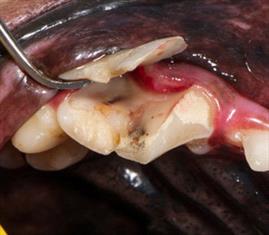 Watch a dog with a bone, and you will see he grabs it with both front paws and munches on it on the side of his teeth. Human teeth chew straight up and down, but animals chew in the back where the teeth are made to shear food into little pieces; like a pair of scissors, they go past each other. When dogs do that and crunch down on something too hard at just the right angle, a piece of the upper fourth premolar breaks off, leaving a slab. Now the teeth slide over each other like pinking shears.
Watch a dog with a bone, and you will see he grabs it with both front paws and munches on it on the side of his teeth. Human teeth chew straight up and down, but animals chew in the back where the teeth are made to shear food into little pieces; like a pair of scissors, they go past each other. When dogs do that and crunch down on something too hard at just the right angle, a piece of the upper fourth premolar breaks off, leaving a slab. Now the teeth slide over each other like pinking shears.
The FDA just came out with another warning for pet owners about bones and bone treats. They re-issue it every few years as a standard warning, emphasizing something different every time. In 2010, the first warning on their list was about dental issues. This year they decided to focus on diseases that can be carried by bones. The FDA is expending most of its time discussing what's in the bone itself that can cause other problems, and I say they are not strong enough on tooth fractures. FDA is not as concerned with the hardness of bone as they are about disease transmission. Maybe their reasoning is that they have a public health obligation, so if your dog is chewing on a bone carrying Salmonella bone and licks you, you can get it. If a dog gets a tooth fracture, it's only a dog problem, not a public health one.
Are any bones safe for your dog's teeth? No.
There are no bones that will not cause problems. Steak bones are too hard for teeth. Antlers are worse than bones because they're harder and smaller. Poultry bones - chicken, turkey, and duck - are really awful because their bones are full of air and thus splinter easily. The pieces can get stuck in the dog's palate (roof of the mouth) and cause an abscess, or get stuck in the esophagus or intestines, most of which requires a surgical fix.
Bone chewing issues don't apply to house cats because they don't like to chew on hard things like dogs do. Smart cookies. However, their larger, wild brethren have major dental issues given that they rip prey apart for lunch, including bones. It turns out that the leading cause of death for lions and jaguars in Africa is related to chewing bones: abscessed teeth. The animal has too much pain to eat, it becomes weaker, and becomes prey instead of running for it. Thankfully domestic cats don't have trouble with rodent bones.
There are other issues that can occur with bones, such as blocked intestines, choking, wounds in the mouth, vomiting/diarrhea, and rectal bleeding (some of which could be fatal if not treated promptly). Since I'm a dentist, I'm more concerned with your dog's teeth than his innards. And you should be aware of the risks that these bones pose.
There's a simple way to test dog treats to see if they can hurt your dog. You have to be able to slap anything you give a dog on your knee and have it not hurt: it has to bend. If it doesn't bend, don't give it, because it won't bend around teeth either. That knee test can save your dog some significant pain and surgery, and can save you a lot of money: five out of five veterinary dentists agree.
21 Comments
Max Wild
November 10, 2022
Susan Barnett-Kiengsiri
January 25, 2018
Phyllis DeGioia
January 19, 2018
Marianne
January 19, 2018
Z Griep
January 18, 2018
Pamela Buck
January 18, 2018
Mary Rowell
January 17, 2018
Carol
January 12, 2018
GSD Mom
January 11, 2018
Heather Roy
January 11, 2018
Shannon Meagher
January 11, 2018
Valerie Shy
January 9, 2018
Billie Williams
January 4, 2018
Phyllis DeGioia
January 2, 2018
Debra Oberbroeckling
January 1, 2018
Peggy
December 25, 2017
Denise Fleck
December 22, 2017
Vicki Thomas
December 19, 2017
Anna Victoria
December 18, 2017
Vickie Dailey
December 15, 2017
Angela H.
December 15, 2017
Janet Holloway
December 15, 2017
Kathie E.
December 15, 2017